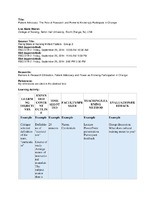| dc.contributor.author | Heelan, Lisa Marie | en |
| dc.date.accessioned | 2015-01-15T13:36:48Z | |
| dc.date.available | 2015-01-15T13:36:48Z | |
| dc.date.issued | 2015-01-15 | |
| dc.identifier | LEAD14PST105 | en |
| dc.identifier.uri | http://hdl.handle.net/10755/338392 | |
| dc.description | <p>Leadership Summit 2014 Theme: Personal. Professional. Global. Held at the Indianapolis Marriott Downtown, Indianapolis, Indiana, USA.</p> | en |
| dc.description.abstract | <p>Session presented on Friday, September 26, 2014:</p>
<p><strong>Background:</strong> The way things have always been done, the sacred cows and traditional practices in nursing are not always supported by the evidence (Makic, Martin, Burns, Philbrick, & Raven, 2013). Evidence based practice (EBP) includes the integration of the best evidence from well-designed quantitative and qualitative studies, clinical expertise, and the perspectives and values of the patient (Institute of Medicine, 2001; Melnyk & Fineout-Overholt, 2005: Polit & Beck, 2012). Research utilization is the translation of EBP into actual practice. Nursing grounded in evidence protects a patient's safety. Patient advocacy is associated with improved patient outcomes (Ciliska, 2006; Hanks, 2010). The role of a nurse includes being a patient advocate (American Nurses Association, 2001; International Council of Nurses, 2012). Patient advocacy in nursing is theoretically defined as safeguarding a patient's autonomy, acting on a patient's behalf, and championing social justice (Bu & Jezewski, 2007). Some examples of nurses advocating for patients include participating in shaping unit policies that provide good care based on evidence and raising questions regarding routine orders or treatments that may cause harm to a patient (Bu, 2005).</p>
<p><strong>Method:</strong> This poster will provide an overview of the literature that explores nurses perceived barriers to research utilization encountered in practice with the concept of power as knowing participation in change. The theoretical framework of the Science of Unitary Human Beings (SUHB) (M. Rogers, 1992) will provide the underpinning for the literature review. A major tenet of the SUHB is that a unitary human being cannot be viewed as separate from his or her environment. Data Sources: CINAHL, EBSCO, SAGE, and MEDLINE-PubMed.</p>
<p><strong>Results:</strong> Kardong-Edgren (2001) has proposed that fulfilling the nursing role of being a patient advocate requires evidence based practice being incorporated into nursing care. Perceived barriers to research utilization include a nurses attitude toward research, access to research, and knowledge of research findings. However, Fink et al (2005) identified that nurses feel powerless within the organization to change practice even when the proposed change is based on research. This finding is supported by Grace (2001) who believed that nurses know the right thing to do, but due to institutional obstacles are prevented from taking action. The literature further suggests that there are a substantial number of nurses who do not perceive that they can influence nursing practice (Fink, et al., 2005; Funk, Champagne, Wiese, & Tornquuist, 1991; Gerrish & Clayton, 2004; Parahoo, 2000; Parahoo & McCaughan, 2001).</p>
<p><strong>Conclusion:</strong> Nurses are the key to improving the quality and safety of all patients. Patient advocacy is a nursing role and is associated with improved outcomes. Two factors have been identified in the literature influencing a nurses ability to advocate: perceived barriers to research utilization and power to influence change in a work setting.</p> | en |
| dc.format | Text-based Document | en |
| dc.language.iso | en | en |
| dc.subject | Barriers to Research Utilization | en |
| dc.subject | Patient Advocacy | en |
| dc.subject | Power as Knowing Participation in Change | en |
| dc.title | Patient advocacy: The role of research and power to knowingly participate in change | en |
| dc.type | Poster | en |
| dc.rights.holder | <p>
All rights reserved by the author(s) and/or publisher(s) listed in this item record unless relinquished in whole or part by a rights notation or a Creative Commons License present in this item record.
</p><p>
All permission requests should be directed accordingly and not to the Sigma Repository.
</p><p>
All submitting authors or publishers have affirmed that when using material in their work where they do not own copyright, they have obtained permission of the copyright holder prior to submission and the rights holder has been acknowledged as necessary.
</p> | |
| dc.description.note | <p>Items submitted to a conference/event were evaluated/peer-reviewed at the time of abstract submission to the event. No other peer-review was provided prior to submission to the Henderson Repository.</p> | en |
| dc.type.category | Full-text | en |
| dc.evidence.level | N/A | en |
| dc.research.approach | N/A | en |
| dc.contributor.department | Iota Alpha at-Large | en |
| dc.author.details | Lisa Marie Heelan, MSN, FNP-BC, ANP-BC | en |
| dc.conference.name | Leadership Summit 2014 | en |
| dc.conference.host | Sigma Theta Tau International | en |
| dc.conference.location | Indianapolis, Indiana, USA | en |
| dc.date.conferenceyear | 2014 | |
| dc.contributor.affiliation | Seton Hall University, South Orange, New Jersey, USA | en |
| dc.description.reviewtype | Abstract Review Only: Reviewed by Event Host | en |
| dc.description.acquisition | Proxy-submission | en |






